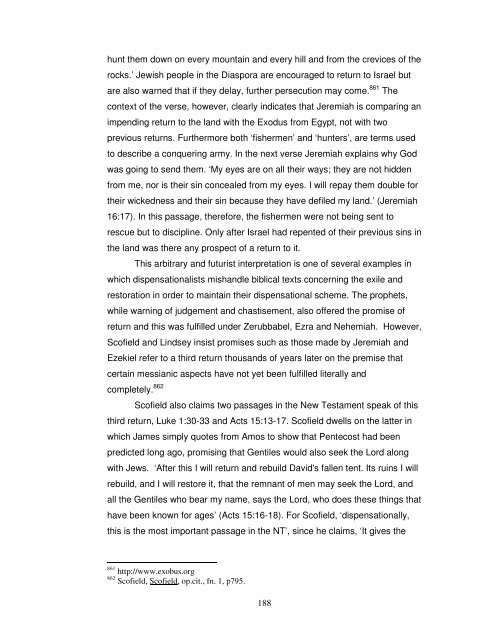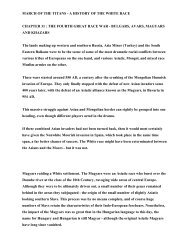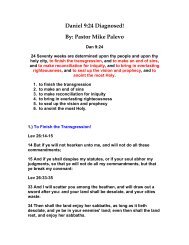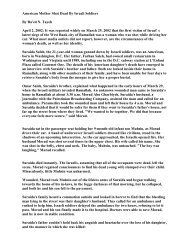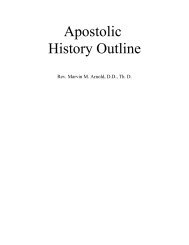- Page 3 and 4:
Contents Chapter 1: Introduction 7
- Page 5 and 6:
4. Eretz Israel: Reclaiming Judea,
- Page 7 and 8:
Chapter 1: Introduction ‘As the n
- Page 9 and 10:
entitled, Die Nationale Wiedergebur
- Page 11 and 12:
war pre-State period. A fortiori, i
- Page 13 and 14:
Conference on Racism held in Durban
- Page 15 and 16:
would suggest that Christians … m
- Page 17 and 18:
eligious broadcaster, to describe d
- Page 19 and 20:
Americans such as Jerry Falwell, 63
- Page 21 and 22:
5. The State of Research into Chris
- Page 23 and 24:
approach to issues such as the rela
- Page 25 and 26:
Chapter 2: The Historical Roots of
- Page 27 and 28:
major paradigm shift in popular thi
- Page 29 and 30:
false prophet), having formed an un
- Page 31 and 32:
‘Though we do not know the time i
- Page 33 and 34:
‘The First Napoleon’s Edict pub
- Page 35 and 36:
Zionism in the literary field’. 1
- Page 37 and 38:
As the postmillennialism of the Ref
- Page 39 and 40:
interest in Jewish Restorationism.
- Page 41 and 42:
‘But still richer benefits will f
- Page 43 and 44:
Arabic, Hebrew, Chaldean, Persian a
- Page 45 and 46:
culmination of God’s purposes for
- Page 47 and 48:
would return to set up his millenni
- Page 49 and 50:
Frere insisted that the prophetic p
- Page 51 and 52:
convinced, and resolved, though alo
- Page 53 and 54:
on earth, a blessing to the whole w
- Page 55 and 56:
speak of the Arabian Jews as their
- Page 57 and 58:
have made such a valedictory statem
- Page 59 and 60:
fundamental reason for which it is
- Page 61 and 62:
ecome completely corrupted; the dis
- Page 63 and 64:
the Rothschilds was negotiating wit
- Page 65 and 66:
diversity of opinion existed within
- Page 67 and 68:
‘When these lectures were first p
- Page 69 and 70:
ecome the first political leader to
- Page 71 and 72:
Master, over Jerusalem, nor prays t
- Page 73 and 74:
Samuel Gobat, a Swiss Lutheran. The
- Page 75 and 76:
missionaries in France and Germany,
- Page 77 and 78:
eward. In the same speech given bef
- Page 79 and 80:
achievement of this object and will
- Page 81 and 82:
ambiguities which have plagued Midd
- Page 83 and 84:
influence on end-time thinking was
- Page 85 and 86:
among other religious sects on the
- Page 87 and 88:
here and in fifty years they will b
- Page 89 and 90:
Zionists in America, like Hechler i
- Page 91 and 92:
‘Why not give Palestine back to t
- Page 93 and 94:
Theodor Herzl by five years in his
- Page 95 and 96:
the pattern of Bible readings and p
- Page 97 and 98:
Oxford University Press as The New
- Page 99 and 100:
Gaebelein has also at times been ac
- Page 101 and 102:
Sultan. The great movement is one o
- Page 103 and 104:
conservative evangelical position o
- Page 105 and 106:
non-profit American agencies in the
- Page 107 and 108:
fundamentalists and evangelicals. 4
- Page 109 and 110:
In 1976, described as ‘the year o
- Page 111 and 112:
ever in the future, Israel were abo
- Page 113 and 114:
about conservation? Why waste time
- Page 115 and 116:
Christian public the reasons for th
- Page 117 and 118:
‘I will never forget the time, Ap
- Page 119 and 120:
adio and TV, Lindsey has a regular
- Page 121 and 122:
political and religious far Right,
- Page 123 and 124:
headquarters in Jerusalem and colla
- Page 125 and 126:
11.2 Jews for Jesus: Messianic Disp
- Page 127 and 128:
for Peace, under the leadership of
- Page 129 and 130:
ias against Israel.’ 593 In the U
- Page 131 and 132:
its monthly News Letter and website
- Page 133 and 134:
LaHaye, Messianic agencies such as
- Page 135 and 136:
thesis. 611 For an appraisal of dev
- Page 137 and 138: accepted even within Brethren circl
- Page 139 and 140: the first, Noah I shall be very bri
- Page 141 and 142: principles, much obscurity appears
- Page 143 and 144: Similarly, in his introduction to t
- Page 145 and 146: non-Christians, whether Jews or Gen
- Page 147 and 148: College of Bible: Clarence Mason, S
- Page 149 and 150: instance, that the Church did not b
- Page 151 and 152: Church.’ 689 The premise that the
- Page 153 and 154: highlights the way New Testament wr
- Page 155 and 156: Communism in 1970 to Islam Fundamen
- Page 157 and 158: Kenneth Barker, the editor of the N
- Page 159 and 160: M.R. DeHann (1946) Hal Lindsey (197
- Page 161 and 162: 11:40-45 is similarly imaginative,
- Page 163 and 164: Without any substantiation Lindsey
- Page 165 and 166: 1820s and 1830s. These were given p
- Page 167 and 168: system of dispensations and led him
- Page 169 and 170: other is related to heaven with hea
- Page 171 and 172: For Scofield, ‘legal obedience’
- Page 173 and 174: lifted up by God for all nations to
- Page 175 and 176: hands.’ Although Brickner forcefu
- Page 177 and 178: Jewish people in the grace of God b
- Page 179 and 180: 12 that this promise of blessing an
- Page 181 and 182: from Mount Sinai and bears children
- Page 183 and 184: would follow their restoration to t
- Page 185 and 186: see their God, worship Him only, an
- Page 187: fulfilment can be reconciled with t
- Page 191 and 192: places at the feast with Abraham, I
- Page 193 and 194: still apply. An examination of the
- Page 195 and 196: with Jews for Jesus, together with
- Page 197 and 198: faithful remnant. 894 John Stott co
- Page 199 and 200: Jerusalem, sees the prediction Jesu
- Page 201 and 202: ‘The Bible also makes clear that
- Page 203 and 204: ways. So, for example, Peter speaks
- Page 205 and 206: Jews. 926 Some 20 years later Time
- Page 207 and 208: must be destroyed; the third Jewish
- Page 209 and 210: ‘Orthodox Jews for many years hav
- Page 211 and 212: Romans. 960 6.3.3 The First Century
- Page 213 and 214: house of God, 974 in which Jesus is
- Page 215 and 216: Jews, while they profess to sacrifi
- Page 217 and 218: ‘By calling this covenant “new,
- Page 219 and 220: Kingdom to Israel and rule from Jer
- Page 221 and 222: Jerusalem would be ‘ploughed like
- Page 223 and 224: predictions’ 1031 and is happy to
- Page 225 and 226: would be part of a European politic
- Page 227 and 228: estraining presence of the Holy Spi
- Page 229 and 230: Scofield’s notes, for example, de
- Page 231 and 232: feet (Zechariah 14:12). This is exa
- Page 233 and 234: already hear the footsteps of Messi
- Page 235 and 236: ooks by apocalyptic dispensationali
- Page 237 and 238: then will the nations be at rest an
- Page 239 and 240:
the people of God and makes chosenn
- Page 241 and 242:
fulfils, completes and at times ann
- Page 243 and 244:
1. The Chosen People : Supporting I
- Page 245 and 246:
some government officials publicly
- Page 247 and 248:
Apartheid State. In it Davis expose
- Page 249 and 250:
Christian Zionists identify with Is
- Page 251 and 252:
global threat posed by Soviet hegem
- Page 253 and 254:
Kansas in 1994 and now comprises a
- Page 255 and 256:
Hebron, Nablus, Sebaste, Jericho, C
- Page 257 and 258:
The Wailing Wall is the religious p
- Page 259 and 260:
Pilgrimage research has shown that
- Page 261 and 262:
Land of Israel as a sign of God’s
- Page 263 and 264:
testimonies of how they have been b
- Page 265 and 266:
Semitism to achieve it. ‘I pray t
- Page 267 and 268:
measure to Jewish terrorism, togeth
- Page 269 and 270:
Samaria (inaccurately termed “the
- Page 271 and 272:
of Beit Jala. 1223 Higton initially
- Page 273 and 274:
epresentatives from 12 countries pr
- Page 275 and 276:
define Zionism too loosely as simpl
- Page 277 and 278:
Readers were invited to ‘Join us
- Page 279 and 280:
organisations involved in facilitat
- Page 281 and 282:
5.2 Searching for the Temple Site I
- Page 283 and 284:
1997, the first red heifer for 2000
- Page 285 and 286:
anti-Christ. 1285 In such a dualist
- Page 287 and 288:
Ramon Bennett illustrates how such
- Page 289 and 290:
40,000 churches, urged congressmen
- Page 291 and 292:
and culture, and are close relative
- Page 293 and 294:
6.4 Demonising Islam Donald Bridge
- Page 295 and 296:
makes you wonder, if they have such
- Page 297 and 298:
attle in the heavens but will soon
- Page 299 and 300:
6. Since Christian Zionists are con
- Page 301 and 302:
continued to occupy and settle the
- Page 303 and 304:
gospel. For Political Dispensationa
- Page 305 and 306:
specific rhetorical questions: ‘I
- Page 307 and 308:
new covenant. In identifying with t
- Page 309 and 310:
Glossary Aliyah A Hebrew word meani
- Page 311 and 312:
Idealism The symbolic interpretatio
- Page 313 and 314:
Bibliography 1. Books Abboushi, Nad
- Page 315 and 316:
Ateek, Naim S. Justice and Only Jus
- Page 317 and 318:
Bell, Gertrude Lowthian. The Desert
- Page 319 and 320:
Brown, Charles. The Reign of Christ
- Page 321 and 322:
Chacour, Elias. We Belong to the La
- Page 323 and 324:
Cotterell, Peter & Max Turner, Ling
- Page 325 and 326:
Davis, Uri. The State of Palestine,
- Page 327 and 328:
Ellis, Marc H. Toward a Jewish Theo
- Page 329 and 330:
Flapan, Simha. Zionism and the Pale
- Page 331 and 332:
Glubb, John Bagot. The Story of the
- Page 333 and 334:
Harrison, John Fletcher Clews. The
- Page 335 and 336:
Hunt, Dave. Peace, Prosperity and t
- Page 337 and 338:
Jeffries, J. M. N. The Balfour Decl
- Page 339 and 340:
Kik, Marcellus J. An Eschatology of
- Page 341 and 342:
Lambert, Lance. Till the Day Dawns:
- Page 343 and 344:
Lindsey, Hal. The 1980’s, Countdo
- Page 345 and 346:
Marsden, George M. Fundamentalism a
- Page 347 and 348:
Motyer, Steve. Israel in the Plan o
- Page 349 and 350:
Packer, J. I. Fundamentalism and th
- Page 351 and 352:
Violence’ in Faith & The Intifada
- Page 353 and 354:
Robertson, O. Palmer. The Christ of
- Page 355 and 356:
Sachar, Howard M. A History of Isra
- Page 357 and 358:
Scofield, Cyrus Ingerson. Scofield
- Page 359 and 360:
Smith, Chuck. Snatched Away, (Costa
- Page 361 and 362:
Taylor, John B. Ezekiel, An Introdu
- Page 363 and 364:
Wagner, Donald E. Dying in the Land
- Page 365 and 366:
Wigoder, Geoffrey. Jewish-Christian
- Page 367 and 368:
Seminary Journal 4.1 Spring (1993),
- Page 369 and 370:
Pevtzov, Lisa. ‘Apocalypse Now, O
- Page 371 and 372:
Smith, Timothy L. ‘Righteousness
- Page 373 and 374:
Hamilton, Kendall, Contreras, Josep
- Page 375 and 376:
Sizer, Stephen. ‘The Broken Promi
- Page 377 and 378:
Hewitt, Garth. ‘Ten Measures of B
- Page 379 and 380:
Hunt, Dave. ‘O Jerusalem, Jerusal
- Page 381 and 382:
CNBC.’ http://electronicintifada.
- Page 383 and 384:
9. Biblical Quotations Biblical quo


